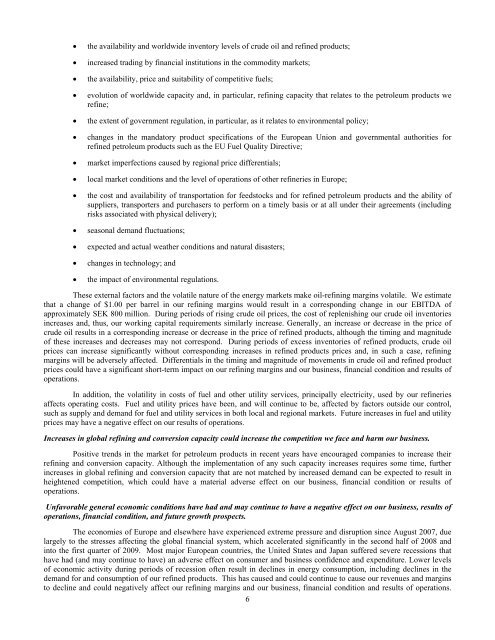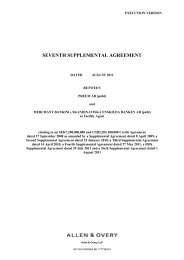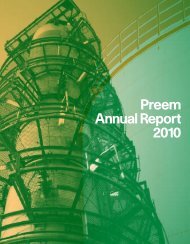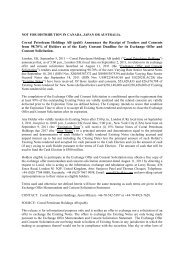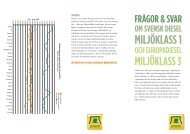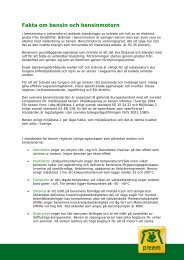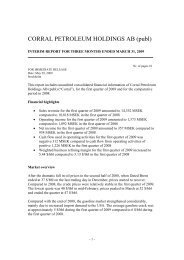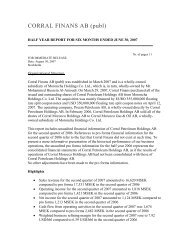the availability and worldwide inventory levels of crude oil and refined products;increased trading by financial institutions in the commodity markets;the availability, price and suitability of competitive fuels;evolution of worldwide capacity and, in particular, refining capacity that relates to the petroleum products werefine;the extent of government regulation, in particular, as it relates to environmental policy;changes in the mandatory product specifications of the European Union and governmental authorities forrefined petroleum products such as the EU Fuel Quality Directive;market imperfections caused by regional price differentials;local market conditions and the level of operations of other refineries in Europe;the cost and availability of transportation for feedstocks and for refined petroleum products and the ability ofsuppliers, transporters and purchasers to perform on a timely basis or at all under their agreements (includingrisks associated with physical delivery);seasonal demand fluctuations;expected and actual weather conditions and natural disasters;changes in technology; andthe impact of environmental regulations.These external factors and the volatile nature of the energy markets make oil-refining margins volatile. We estimatethat a change of $1.00 per barrel in our refining margins would result in a corresponding change in our EBITDA ofapproximately SEK 800 million. During periods of rising crude oil prices, the cost of replenishing our crude oil inventoriesincreases and, thus, our working capital requirements similarly increase. Generally, an increase or decrease in the price ofcrude oil results in a corresponding increase or decrease in the price of refined products, although the timing and magnitudeof these increases and decreases may not correspond. During periods of excess inventories of refined products, crude oilprices can increase significantly without corresponding increases in refined products prices and, in such a case, refiningmargins will be adversely affected. Differentials in the timing and magnitude of movements in crude oil and refined productprices could have a significant short-term impact on our refining margins and our business, financial condition and results ofoperations.In addition, the volatility in costs of fuel and other utility services, principally electricity, used by our refineriesaffects operating costs. Fuel and utility prices have been, and will continue to be, affected by factors outside our control,such as supply and demand for fuel and utility services in both local and regional markets. Future increases in fuel and utilityprices may have a negative effect on our results of operations.Increases in global refining and conversion capacity could increase the competition we face and harm our business.Positive trends in the market for petroleum products in recent years have encouraged companies to increase theirrefining and conversion capacity. Although the implementation of any such capacity increases requires some time, furtherincreases in global refining and conversion capacity that are not matched by increased demand can be expected to result inheightened competition, which could have a material adverse effect on our business, financial condition or results ofoperations.Unfavorable general economic conditions have had and may continue to have a negative effect on our business, results ofoperations, financial condition, and future growth prospects.The economies of Europe and elsewhere have experienced extreme pressure and disruption since August 2007, duelargely to the stresses affecting the global financial system, which accelerated significantly in the second half of 2008 andinto the first quarter of 2009. Most major European countries, the United States and Japan suffered severe recessions thathave had (and may continue to have) an adverse effect on consumer and business confidence and expenditure. Lower levelsof economic activity during periods of recession often result in declines in energy consumption, including declines in thedemand for and consumption of our refined products. This has caused and could continue to cause our revenues and marginsto decline and could negatively affect our refining margins and our business, financial condition and results of operations.6
Although major economies started a recovery in late 2009 and continued to grow in 2010, should the global economy relapseinto recession or should a new global and long-lasting economic recession occur, our business, strategy, and future prospectscould be negatively affected with consequent further negative impacts on our business, cash flow and financial position.Our business is very competitive and increased competition could adversely affect our financial condition and results ofoperations.We operate in a highly competitive industry and actions of our competitors could reduce our market share orprofitability. Competition is based on the ability to obtain and process crude oil and other feedstocks at the lowest cost,refinery efficiency, refinery product mix and product distribution. We are not engaged in the petroleum exploration andproduction business and therefore do not produce any of our crude oil feedstocks. Competitors that have their ownproduction are at times able to offset losses from refining operations with profits from production operations, and may bebetter positioned to withstand periods of depressed refining margins or feedstock shortages. In order to remain competitive,we must continue to upgrade our facilities, and we must monitor shifts in product demand. Our supply and refining segmentcompetes principally with, among others, ST1 Refinery <strong>AB</strong> and <strong>AB</strong> Svenska Statoil, as well as with Neste Oil Corporation,who also have facilities to process larger volumes of lower-priced, high-sulphur heavy Russian crude. Our marketingsegment, which includes the station and consumer division through which we sell gasoline and other refined products to retailcustomers, competes primarily with <strong>AB</strong> Svenska Statoil, OK-Q8 <strong>AB</strong>, ST1 Energy <strong>AB</strong> and ST1 Sverige <strong>AB</strong>. In addition, wecompete with other industries that provide alternative means to satisfy the energy and fuel requirements of our industrial,commercial and individual consumers. Inability to compete effectively with these competitors or increased competition inthe oil refining industry could result in a decrease in our market share or negatively impact on our refining margins, either ofwhich could adversely affect our financial condition and results of operations.We are faced with operational hazards as well as potential interruptions that could have a material adverse effect on ourfinancial condition and results of operations.Our operations are subject to all of the risks normally associated with oil refining, storage, transportation anddistribution, including fire, mechanical failure and equipment shutdowns and other unforeseen events. In any of thesesituations, undamaged refinery processing units may be dependent on or interact with damaged sections of our refineries and,accordingly, are also subject to being shut down. In addition, damage to the pipelines transporting products to and from eachof our refineries’ processing facilities could cause an interruption in production at those facilities. Any of these risks couldresult in damage to or loss of property, suspension of operations, injury or death to personnel or third parties, or damage orharm to the environment. We depend on the cash flows from production from <strong>Preem</strong>raff Lysekil and <strong>Preem</strong>raff Gothenburg.Therefore, a prolonged interruption in production at either refinery would have a material adverse impact on our business,financial condition, results of operations and cash flow. As protection against these hazards, we maintain property, casualty,and business interruption insurance in accordance with industry standards. Although there can be no assurance that theamount of insurance carried by us is sufficient to protect us fully in all events, all such insurance is carried at levels ofcoverage and deductibles that we consider financially prudent. However, a major loss for which we are underinsured oruninsured could have a material adverse effect on our business, financial condition, results of operations and cash flows.In the future, we may not be able to maintain or obtain insurance of the type and amount we desire at reasonablerates. As a result of factors affecting the insurance market, insurance premiums with respect to renewed insurance policiesmay increase significantly compared to what we are currently paying. In addition, some forms of insurance may becomeunavailable in the future, or unavailable on the terms we believe are economically acceptable, the level of coverage providedby renewed policies may decrease, while deductibles and/or waiting periods may increase, compared to our existinginsurance policies.We are subject to governmental laws and regulations, including environmental laws, occupational health and safety laws,competition laws, energy laws and tax laws in Sweden and elsewhere, which may impact our business and results ofoperations.We are subject to various supranational, national, regional and local environmental laws and regulations relating toemissions standards for, and the safe storage and transportation of, our products. We are also subject to EU and Swedishenvironmental regulations concerning refined products. Sweden has among the strictest environmental specifications in theEU. We are subject to strict EU environmental regulations. These regulations restrict the sulphur content of both gasolineand diesel and the aromatic content of gasoline and impose a CO2 emissions trading program. For the trading period of 2008to 2012, we have obtained emission allowances of 2,467,000 tons of carbon dioxide per year, which we believe is sufficientto cover our emissions. However, there is uncertainty with regard to the allocation of emission allowances during the tradingperiod from 2013 to 2020. Manufacture of refined petroleum products has been included in the European Union list ofsectors that are at risk of “carbon leakage.” The issue of carbon leakage relates to the risk that companies in sectors subjectto strong international competition might relocate from the European Union to third countries with less stringent constraints7


